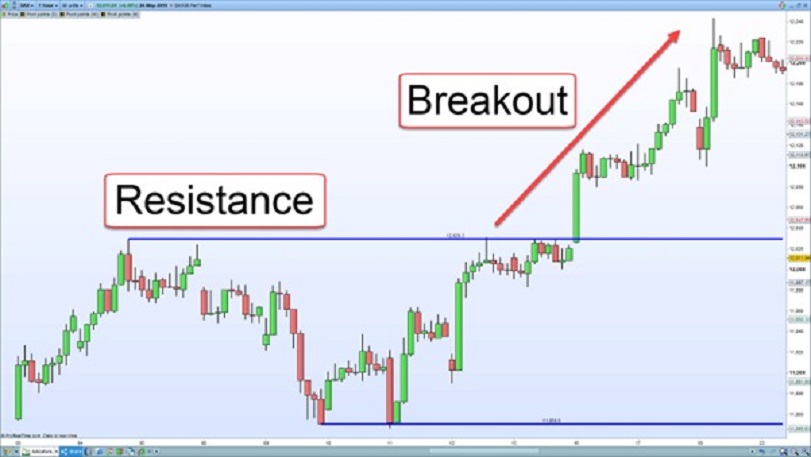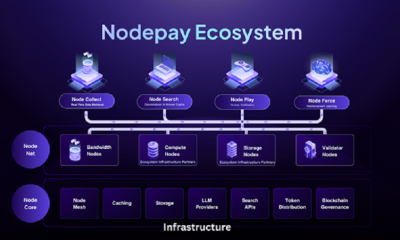Economy
Mastering Intraday Trading Strategy for Success With Traders Union

Intraday trading is all about quick profits in the fast-paced world of finance. To succeed, you need effective Forex trading strategies. Traders Union (TU) experts are here to help you understand and use the top intraday trading strategies. They’ll share tips on how to spot the right times to enter and exit trades, allowing you to make the most of your opportunities and maximize profits in intraday trading.
Mastering intraday trading
TU’s analysts explained that intraday trading, also known as day trading, involves buying and selling securities within a single trading day. To begin intraday trading successfully, follow these tips:
- Time sensitivity and analysis:
Focus on real-time charts and indicators.
Use shorter time frames for quick decisions.
- Diverse trading strategies:
Choose strategies based on market conditions.
Explore scalping, range trading, and more.
- Quick decision-making and time management:
Stay attentive and act swiftly.
Utilize tools like VWAP orders for efficiency.
- Effective risk management:
Implement stop-loss orders.
Set clear profit and loss limits.
- Profit potential and market understanding:
Be aware of market volatility.
Beginners should learn market analysis, risk management, and trend interpretation.
Intraday trading offers profit potential but requires caution and market knowledge.
The best intraday trading strategies
In Forex, it is imperative to use an effective intraday trading strategy. Experts at Traders Union have explored five key intraday trading strategies that experienced traders use. By understanding these strategies and their entry and exit points, you can make informed decisions and maximize profits.
- Scalping with Bollinger bands – traders aim to make quick profits by identifying price volatility using Bollinger bands.
- Breakout trading – this strategy targets price movements when they break through support or resistance levels.
- Moving average crossover (using EMA 13 and 26) – traders use two moving averages to spot potential trend changes.
- Pivot points – these indicators help identify support and resistance levels for effective trade planning.
- Price action strategy – traders study price patterns and candlestick formations to predict future price movements and enter trades accordingly.
Advantages and disadvantages
Intraday trading, a fast-paced trading style, comes with its own set of pros and cons. TU’s experts outline the pros and cons of intraday trading:
Advantages:
- Intraday traders can use margin accounts to control larger positions with less investment, potentially increasing profits if trades go well.
- Successful intraday traders can create a steady income source by consistently making profitable trades and withdrawing profits daily.
- Intraday traders close positions before the market closes, avoiding overnight risks, such as unexpected events or news.
- Intraday trading allows traders to profit from short-term price changes and make multiple trades in a single day.
Disadvantages:
- The market can deceive intraday traders, leading to overconfidence and eventual losses. Caution is essential to avoid impulsive trading.
- Intraday trading requires strict discipline and risk management to prevent adverse effects on trading performance.
- Intraday traders need proficiency in market analysis, chart interpretation, and emotional control. Consistency and continuous learning are crucial.
Intraday trading offers opportunities, but it also demands caution, discipline, and a dedicated skill set.
The effectiveness and profitability of intraday trading
Traders Union analysts highlighted that intraday trading can be profitable with the right strategy. Its profitability depends on factors like skill, knowledge, strategy, and market conditions. It has potential for profit but also risks. Traders must create a solid plan based on research and tested strategies. Understanding technical analysis, charts, and indicators is crucial. Staying informed about market news helps make informed decisions.
Conclusion
Intraday trading can be profitable with the right strategies, but it also comes with risks. To succeed, traders must be time-sensitive and use various strategies tailored to market conditions. Quick decision-making, efficient risk management, and market understanding are crucial. Traders can employ strategies like scalping with Bollinger Bands, breakout trading, moving average crossovers, pivot points, and price action analysis.
Economy
Naira Fall 0.24% to N1,341/$1 at Official FX Window

By Adedapo Adesanya
The Naira depreciated further against the Dollar in the Nigerian Autonomous Foreign Exchange Market (NAFEX) on Thursday, February 19, by N3.24 or 0.24 per cent to N1,341.35/$1 from the N1,338.11/$1 it was traded a day earlier.
However, it improved its value against the Pound Sterling in the official market during the session by N11.16 to sell for N1,805.86/£1 compared with the previous day’s N1,817.02/£1, and gained N7.83 against the Euro to close at N1,577.29/€1 versus Wednesday’s closing price of N1,585.12/€1.
At the GTBank forex counter, the Naira lost N2 against the greenback to settle at N1,349/$1 compared with the N1,347/$1 it was exchanged at midweek, and at the black market, the exchange rate remained unchanged at N1,370/$1.
The performance of the domestic currency in the spot market was weak yesterday amid prevailing dynamics of supply and demand, as the Central Bank of Nigeria (CBN) maintains its efforts to stabilise the foreign exchange market. The exchange rate remained within the expected range, lifted by strong forex inflows and central bank dollar sales to Bureaux de Change (BDC) operators.
Meanwhile, the cryptocurrency market remained bearish, as there was continued caution in coins amid shaky interest in the digital assets.
On the policy front, there were tentative signs of progress on the digital asset market structure bill. The White House hosted talks between crypto industry representatives and bankers, which yielded incremental movement, though no compromise has yet emerged.
Ripple (XRP) declined by 1.7 per cent to $1.39, Litecoin (LTC) went down by 1.3 per cent to $52.46, Cardano (ADA) dropped 0.8 per cent to trade at $0.2715, Dogecoin (DOGE) retreated by 0.7 per cent to $0.0978, and Ethereum (ETH) contracted by 0.2 per cent to $1,943.30.
On the flip side, Solana (SOL) appreciated by 0.8 per cent to $82.12, Bitcoin improved its value by 0.7 per cent to $66,854.86, and Binance Coin (BNB) chalked up 0.1 per cent to sell for $605.58, while the US Dollar Tether (USDT) and the US Dollar Coin (USDC) closed flat at $1.00 each.
Economy
US-Iran Conflict Worries Lift Crude Oil Prices by 2%

By Adedapo Adesanya
Crude oil prices were up by around 2 per cent as traders worried about escalating tensions between the United States and Iran, which have stepped up military activity in the oil-producing Middle East.
The price of Brent crude futures grew by $1.31 or 1.9 per cent to $71.66 a barrel, while US West Texas Intermediate (WTI) crude futures appreciated by $1.24 or 1.9 per cent to $66.43 a barrel.
Axios reported that the US is moving closer to a war with Iran. A campaign in Iran would be nothing like the Venezuela blitz and could involve “a massive, weeks-long campaign,” the publication reported, citing sources. The US has deployed aircraft carriers, warships and jets to the region.
Two aircraft carriers and dozens of land-based planes have moved to the Gulf, which The Wall Street Journal reported was enough to wage a sustained and weekslong air war against Iran.
Although the US President Donald Trump has not yet made a final decision about a possible military intervention, it has been reported that it has been discussed among top US national security officials.
However, it was also reported that the US President has discussed options, including a strike that could be ordered as soon as this coming Saturday. He warned Iran on Thursday that it must reach a deal over its nuclear programme or “bad things” will happen, and appeared to set a 10-day deadline before the US might take action.
Iran planned a joint naval exercise with Russia after it shut down the Strait of Hormuz for a few hours for military drills. The Strait is a vital link for trade, with about 20 per cent of global oil supply passing through it.
It issued a notice to airmen that it planned rocket launches in areas across the south of the country on Thursday, while some countries have asked their residents to leave Iran.
Adding to the difficult U.S.-Iran talks, the Russia-Ukraine talks in Geneva also broke down without any breakthrough and pushed oil prices higher.
Crude oil exports from Saudi Arabia, the world’s largest oil exporter, fell to 6.988 million barrels per day, their lowest level since September.
US crude stocks dropped by 9 million barrels, as refining utilisation and exports climbed, according to the Energy Information Administration (EIA). Gasoline (petrol) and distillate inventories also fell last week, thanks to higher consumer demand. Before this, the American Petroleum Institute (API) estimated that crude oil inventories in the US fell by 609,000 barrels in the week ending February 13, after increasing by 13.4 million barrels in the week prior.
Economy
Risevest Gets SEC Licence to Legally Operate in Nigeria’s Capital Market

By Adedapo Adesanya
A Nigerian fintech that allows users to invest in US Dollar-denominated assets, Risevest, has secured a Fund and Portfolio Manager licence from the Securities and Exchange Commission (SEC).
The new licence, obtained through its subsidiary, RV Fund Management Limited, brings Risevest’s operations under the capital market’s regulatory framework, enabling it to operate independently and legally in the country.
“This approval reflects months of rigorous review and engagement,” Mr Eke Urum, Risevest’s co-founder, wrote in a message to users on Wednesday. “We’re grateful to the Securities and Exchange Commission for the critical work they do in safeguarding Nigeria’s financial system and maintaining standards that protect investors. Strong regulation builds strong markets and strong markets build lasting wealth.”
This marks a pivotal regulatory win for Risevest, which in January 2025 came under pressure after the regulator publicly warned Nigerians against investing through the platform, citing a lack of a required licence to operate within Nigeria’s capital market.
In a response, Risevest said its Nigerian investment activities were safeguarded through a trusteeship arrangement with Meristem Trustees Limited, an SEC-licensed trustee.
Risevest’s Nigerian operations were previously structured through partnerships and regulatory cover, most notably its September 2023 acquisition of Chaka, an SEC-licensed digital trading startup. The deal allowed Risevest to leverage Chaka’s licence to provide Nigerian users with access to global securities.
With this, Risevest joins other regulated fintech including Bamboo and Trove, with a proper broker-dealer licence.
“It has always been our goal to operate at the highest level of global compliance,” Mr Urum noted.
The licence positions the company to legally capture a part ofthe rising interest in Nigeria’s capital market, with a young, booming population seeking profitable investment and avoiding Ponzi schemes.
Founded in 2019 by Mr Urum, Mr Bosun Olanrewaju, and Mr Tony Odiba, Risevest curates and presents portfolios in US stocks and global fixed-income assets, and allows users to choose how much they want to invest.
In 2024, the company acquired Hisa, a Kenyan investment startup, marking its entry into the East African country.
-

 Feature/OPED6 years ago
Feature/OPED6 years agoDavos was Different this year
-
Travel/Tourism10 years ago
Lagos Seals Western Lodge Hotel In Ikorodu
-

 Showbiz3 years ago
Showbiz3 years agoEstranged Lover Releases Videos of Empress Njamah Bathing
-

 Banking8 years ago
Banking8 years agoSort Codes of GTBank Branches in Nigeria
-

 Economy3 years ago
Economy3 years agoSubsidy Removal: CNG at N130 Per Litre Cheaper Than Petrol—IPMAN
-

 Banking3 years ago
Banking3 years agoSort Codes of UBA Branches in Nigeria
-

 Banking3 years ago
Banking3 years agoFirst Bank Announces Planned Downtime
-

 Sports3 years ago
Sports3 years agoHighest Paid Nigerian Footballer – How Much Do Nigerian Footballers Earn



















